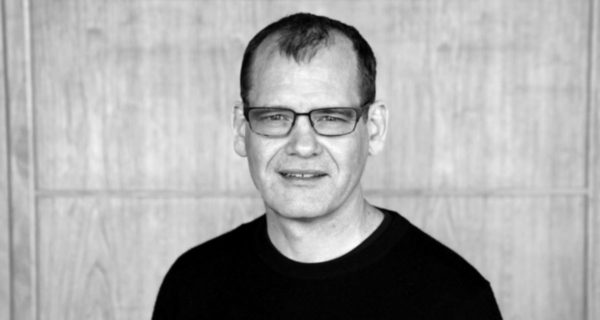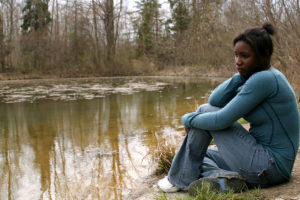Climate change has the potential to affect every being on this planet, yet broad conversations about this complex problem are often limited to scientific and political spheres. Scholars and scientists, including those at the Center for Healthy Minds, are hoping to change that.
Center faculty member and Religious Studies scholar John Dunne participated in a dialogue with spiritual leaders, ethicists, scientists, and economists to come up with new insights and solutions for climate change. Along with Daniel Goleman, he is co-editor of the new book “Ecology, Ethics and Interdependence” focusing on a dialogue with His Holiness the Dalai Lama and other world experts to explore how humanity can collectively address a problem as large as climate change. He shares some key take-aways from the conversation.

Why is it necessary to see climate change as a religious and spiritual challenge in addition to a scientific or political challenge?
John Dunne: It’s clear that humans have to do something about this massive problem and that we have to act together. The voices in the room for this dialogue, which was convened by the Mind & Life Institute, helped us understand the problem from different perspectives. Climate change is almost perfectly designed to be a problem that people can’t conceptualize and can’t even notice until it’s too late.
One of the main features of religion is that it structures our reality and the way in which we see the world. Even for those of us who don’t identify as religious – we have a cultural schema, a mindset – that we’ve inherited over generations. We all are constructing our reality with things that look like religion even if we don’t formally have a religious affiliation.
A good example of how these frameworks can shape people’s views of climate change comes from my colleague Sallie McFague, who does theological work on Christianity. She speaks of the world as God’s body, and climate change is a sign that something has profoundly disturbed that body.
For Sallie, climate change is a deeply spiritual challenge: just as a balanced spiritual life enables us to care for our physical bodies, how can our spirituality lead us to behave in ways that heal the entire planet?
When we notice an imbalance in our own bodies, we might choose to change our diet and consume healthier foods. Likewise, when we see drastic imbalances emerging in the “body” that is our planetary home, do we need to go on an energy “diet” where we only use energy sources that are sustainable and don’t contribute to climate change? The take-home message from Sallie and others is that we need to expand our circle of spiritual concern into the environment itself and step back from self-destructive behaviors.
“One way to confront [the consumer lifestyle] is to step back from needless consumption or the pursuit of temporary highs and instead ask ourselves what really constitutes the good life, and whether we can achieve that in a simpler way that really connects with what we value.”
On a daily basis, how might these frameworks play out in people’s lives?
Many of the forces that are accelerating climate change emerge from a consumer lifestyle that 20 percent of the planet has and 80 percent of the planet wants. That lifestyle is especially prevalent in the United States, but if the rest of the world tries to live that way, then the future looks bleak. One way to confront this challenge is to step back from needless consumption or the pursuit of temporary highs and instead ask ourselves what really constitutes the good life, and whether we can achieve that in a simpler way that really connects with what we value.
Spiritual frameworks come into play because they are what enable us to explore what we mean by a “good life,” and spiritual communities and practices also give us the motivation and means to change things in ways that lead us to that kind of flourishing.
If we don’t change our concepts of a life well lived to include our effects on each other and the planet, our levels of resource consumption and environmental degradation will only grow. Yet in many ways, we all know that a life that is more mindfully aware of consumption and environmental impacts could easily be more fulfilling than a life focused on consuming more and more.
The dialogue featured in the book included faith leaders, including the Dalai Lama. How does Buddhism enrich this conversation in addition to other religious traditions?
One of the main features of climate change is interdependence, which is a central aspect of how our environment works, and how we are related to it. A major aspect of interdependence is that effects ripple outward from an action, but they then also circle back to affect the actor too. This kind of interdependence is a core feature of Buddhism, and it has been articulated in Buddhist philosophy and contemplative practices in ways that can be especially helpful in dealing with climate change.
This is what I suspect fuels His Holiness the Dalai Lama’s interest in climate change. He sees it through the compassionate aspect of interdependence: being concerned for everybody, not just your neighbor or yourself, but rather all beings in this universe. That level of interdependent awareness – the idea that we’re not separate but a part of the environment – is what drives Buddhist interest and provides different resources for dealing with the problem.
"Without a basic starting point in the mind – even just a sincere wish to lead a better life – our efforts at enhancing our well-being are unlikely to succeed, even if we have all of the right external circumstances."
How might psychology and religion lend insights that spur action against climate change?
At the Center for Healthy Minds, when we talk about well-being, we embrace the idea that it’s something you can actually learn. But well-being isn’t just an internal state of mind; it’s also a way of leading a life and a way of interacting with others.
As the old saying in Buddhism goes “The mind is what pulls the cart.” Without a basic starting point in the mind – even just a sincere wish to lead a better life – our efforts at enhancing our well-being are unlikely to succeed, even if we have all of the right external circumstances. But starting with that basic motivation, we can use our minds to learn how well-being works, and then apply that understanding by acquiring the skills that enable us not only to help ourselves, but also our families, communities and institutions. And it’s probably clear how this relates to climate change.
As our UW–Madison colleague Jonathan Patz notes in the book, climate change can be thought of as a public health issue on a global level, and just as well-being for us as individuals can be trained, so too we can learn what it takes to enhance our well-being in a more global way. Again, we start with that motivation, and then we need to educate ourselves about what we can do both collectively and individually to face this challenge.
As it turns out, even very small changes at the individual level can have a significant impact when they are scaled up in a global way. Changing the thermostat even just a little to save energy in one household can have a huge impact when many others do it. The same is true of other simple and small changes, such as choosing to bicycle or walk or use public transportation a bit more often. And when individuals work together, they can also make institutions change in ways that intelligently manage our environmental impacts at the level of governments, corporations and the like.
Certainly, all this is challenging, and we already see that climate change is not going to be easy for us. But just as we can choose at any time to become more aware and attuned to what contributes to our personal well-being, we can also learn to bring our capacity for constructive change to the larger realm of the environment itself.
Interview conducted and edited by Marianne Spoon






